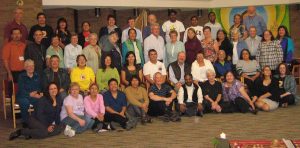HOMILY ADVENT SUN 2-C
Repent, and Be a People of Hope
(Baruch 5:1-9; Psalm 126; Phil 1:3-6, 8-11; Luke 3:1-6)
*************************************************************
Joe was amazed at how his friend Bob treated his wife during a visit at their house. Bob hugged his wife when she came home from shopping, thanked her for all she did, complimented her on the supper, kissed her and commented on how good she looked. Later, when Joe asked about his behaviour, Bob told him he had started that six months earlier and it had transformed his marriage. Joe decided to give it a try. As soon as he arrived home, he gave his wife a kiss, hugged her and told her how much he loved her, at which she burst into tears. Joe was confused and asked her why that reaction. She replied, “This is the worst day of my life. First, little Billy fell off his bike and twisted his ankle. Then, the washing machine broke and flooded the basement. And now, you come home drunk!”
Have you sincerely tried to change something about yourself?
Repent, and be a people of hope
This is the second Sunday of Advent. The nights are becoming longer and darker, symbolic of the darkness and evil in our world, of all that needs changing and healing in our lives. Amid this reality, the Word of God shines forth as a source of hope and light in our darkness
The first reading from Isaiah promises that a shoot will come forth, that the Spirit of God will be upon him; that there will be harmony and peace and no more suffering or pain. The psalm adds that justice and peace shall flourish in the future. The second reading from Philippians presents us with the ideal of love overflowing, purity and righteousness. How could this hope ever be realized? we might ask ourselves.
The answer lies in the gospel. Luke situates the coming of John the Baptist solidly within history, describing in detail the political situation of that time. He is trying to communicate that this is for real, to take this seriously. John’s message of genuine heartfelt repentance is the way to realize this biblical ideal. We must go to the root of our sins and sinfulness and confess our sins by the power of the Holy Spirit and we will see the salvation of our God.
Our society resists this. As the big book of A.A. states it, we seek a softer, easier way. The practice in some countries and cities to displace the poor, raze the slums and build up-scale shops in their place to attract tourists is symbolic of superficial repentance. Genuine change for these cities, John Weir pointed out in his comment in the Living With Christ for this Sunday some years ago, would be affordable housing, guaranteed rights, accessible health care, equal employment opportunities and fair distribution of planetary resources. These are accomplishments of which cities could be proud.
For John the Baptist, change begins with the individual. Luke identifies John with the voice in the wilderness that Isaiah wrote about who called for change and transformation. Our response must be genuine, heartfelt and go to the roots of our own sinfulness – that which makes us sin. The valley of our selfishness must be filled, the mountain of our false pride must be levelled, the crooked ways of our guilt must be made straight, and the rough ways of our anger must be made smooth. Then we shall experience the peace, joy, justice – the salvation of our God, and live the ideal that the Word of God holds out to us today.
There is cause for hope here. Jesus is God’s definitive answer to evil and suffering. In him, we have the assurance that God shares our outrage and our pain. From him, we learn how to work for that peace which God desires so passionately.
The Church, above all, has been given the mandate to establish justice and harmony upon the holy mountain – and someday, however distant, we will accomplish this, through the power of Jesus’ name.

RTS gathering Nov 2017 Saskatoon
The Returning to Spirit program is a good example of living out this gospel. It brings together both First Nations peoples and non-Indigenous clergy, religious and pastoral ministers in a process of healing, communication and reconciliation. First, they separately go through a process of unmasking the stories they built around past hurts that keeps them victims of their own anger and need to “be right.” Then they come together to hear each other out with respectful understanding and compassion and let go of years of garbage to find new freedom and reconciliation.
The Eucharist begins with repentance (the Penitential rite) leading into a celebration of hope (the Word and the Bread of eternal life). May our celebration today help us all genuinely repent and be a people of hope



